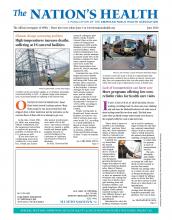
An international initiative is gauging how well health workers and systems serve people with IDD.
Photo by Bevan Goldswain, courtesy iStockphoto
A new Special Olympics global research initiative aims to both reveal and close health care system gaps to better serve people with intellectual and developmental disabilities.
Special Olympics recently launched its Rosemary Collaboratory initiative, which tasks research teams with evaluating IDD inclusivity in health care systems in eight countries: Chinese Taipei, India, Ireland, Nigeria, Pakistan, Paraguay, South Africa and the U.S. In America, the work has a focus on Pennsylvania, Washington state and Wisconsin.
IDD inclusivity is important because there are barriers at all levels for people with IDD, said Dimitri Christakis, MD, MPH, chief health officer for Special Olympics. Barriers range from physicians who never received training in medical school, to health care facilities that are not designed with patient sensory issues in mind.
“The reality is that people with IDD live 12 to 20 years less than people without IDD, so there are real consequences of getting inadequate health care or poor health care,” Christakis told The Nation’s Health.
Researchers will evaluate health systems using an assessment from the Missing Billion Initiative, an international effort to transform data and research on disability inclusion into advocacy and innovative programs to reduce health inequity. Health systems will be scored on IDD inclusivity across multiple areas such as health care affordability, health professional training and health financing. The assessment will also determine if physicians are adequately reimbursed for treating patients with IDD.
Christakis said health financing is particularly important because health care providers are typically not reimbursed for care of people with IDD at the same rates as when caring for people without IDD, which could lead them to hesitate about taking them on as patients.
“You have to speak more slowly, you have to make sure they understand what you’re saying,” Christakis said. “You might have to make other accommodations. The reality is caring for someone with IDD is going to take longer than caring for someone without IDD. And that should be reflected in reimbursement.”
The initiative adjusted and added indicators to its existing system-level assessment on disability inclusion after consulting with IDD experts from countries such as South Africa, England and the U.S.
Findings from the initiative will be shared in a global report on the health of people with IDD that Special Olympics plans to launch in 2025. For more on the Rosemary Collaboratory, visit www.special olympics.org.
- Copyright The Nation’s Health, American Public Health Association









